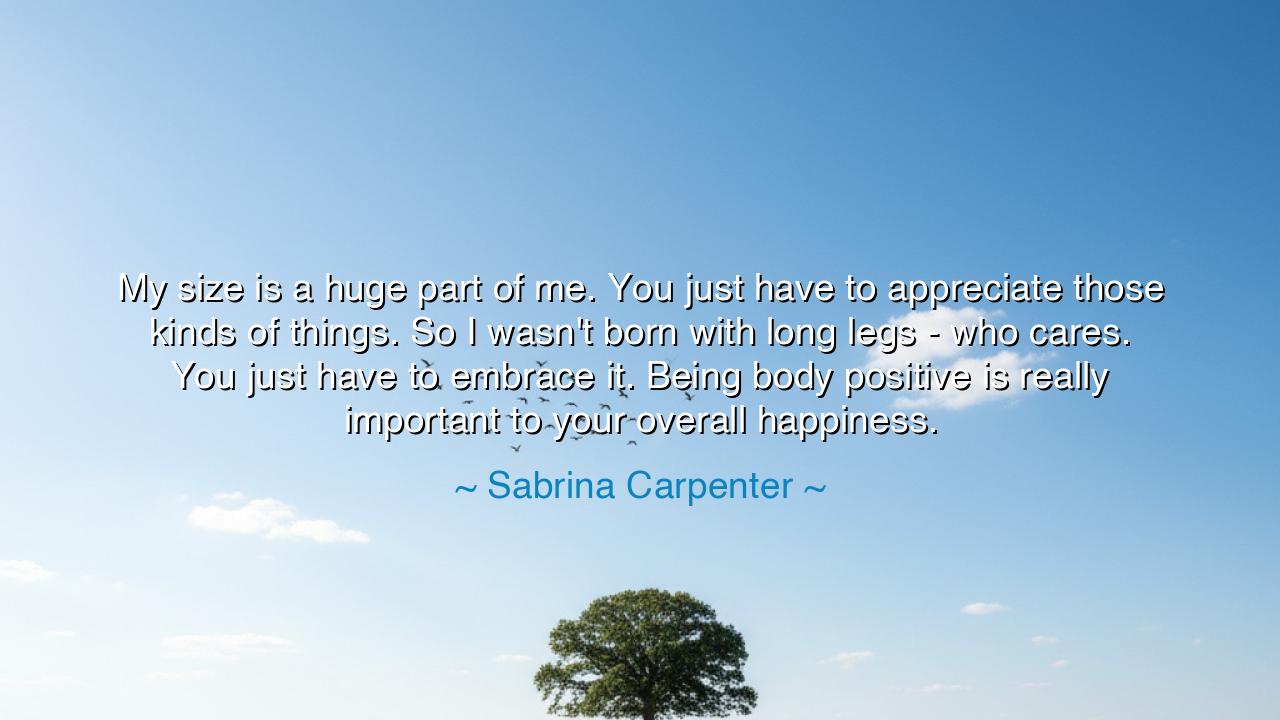
My size is a huge part of me. You just have to appreciate those
My size is a huge part of me. You just have to appreciate those kinds of things. So I wasn't born with long legs - who cares. You just have to embrace it. Being body positive is really important to your overall happiness.






In a world often ruled by illusion and comparison, Sabrina Carpenter spoke words of radiant truth: “My size is a huge part of me. You just have to appreciate those kinds of things. So I wasn’t born with long legs — who cares. You just have to embrace it. Being body positive is really important to your overall happiness.” These words, though simple, carry the weight of a timeless teaching. They speak not only to self-acceptance, but to the ancient wisdom that joy and peace begin when one ceases to fight against one’s own nature. For in a world that seeks to mold every soul into sameness, to embrace oneself is an act of quiet rebellion — a declaration of sacred worth.
Carpenter, a singer and actress who has stood under the relentless gaze of fame, knows the sharp edge of expectation. In her reflection, she reminds us that beauty does not arise from perfection, but from acceptance. The ancients, too, knew this truth. The philosopher Epictetus, once a slave and later a teacher of Stoic wisdom, said: “Do not seek to have events happen as you wish, but wish them to happen as they do.” The same truth applies to the body and the soul. The wise do not curse the form they are given — they honor it, for it is the vessel through which their spirit moves, learns, and creates. Carpenter’s words echo this timeless philosophy: to love oneself not despite one’s differences, but because of them.
To say “My size is a huge part of me” is to affirm that identity is not a flaw to be hidden, but a truth to be celebrated. Each human being, in their form and presence, bears a unique harmony — a melody written by the hands of time and nature. The world may praise certain shapes, certain features, certain ideals, but those are shifting shadows. True beauty, as the ancients taught, is not found in symmetry of limb or proportion of feature, but in the light of authenticity. When one accepts themselves as they are, they become radiant, and that radiance cannot be measured in inches or weighed on scales.
Consider the story of Frida Kahlo, the Mexican painter whose body was scarred and broken by tragedy, yet whose art blazed with color, power, and self-love. She painted herself as she was — imperfect, wounded, magnificent. The world, which once pitied her, came to revere her. Why? Because she embraced her truth without apology. Like Carpenter, she refused to see her physical form as limitation; she saw it as part of her identity, a sacred inheritance that gave her art meaning and soul. Such courage — the courage to embrace oneself fully — is the seed of freedom.
To be body positive, as Carpenter teaches, is not vanity; it is liberation. It is the act of unbinding the spirit from the chains of comparison. For what is happiness if not the ability to live at peace within one’s own skin? The ancients said, “Know thyself.” But Carpenter’s wisdom adds: And love thyself once you know. Many chase after happiness as if it lies beyond them, when in truth it dwells quietly within — waiting to be awakened by gratitude for one’s being.
The world will always whisper that you are not enough — not tall enough, not thin enough, not strong enough, not beautiful enough. Yet those who listen to such whispers lose themselves in illusions. True joy begins the moment you turn inward and say, “I am enough.” It is the moment you look in the mirror, not seeking approval, but offering kindness. Every scar, every shape, every mark tells the story of who you are — and every story, if embraced, becomes art.
So let this be the teaching to those who walk after us: do not measure yourself against others, but measure yourself by your courage to accept and love your own form. Celebrate what makes you different, for those differences are the notes of your unique song. Cultivate body positivity not as a slogan, but as a way of living — by speaking gently to yourself, by rejecting cruelty disguised as beauty, and by choosing gratitude over judgment.
For as Sabrina Carpenter reminds us, the path to happiness begins not with changing who you are, but with embracing who you already are. The soul that learns this truth stands unshaken in a world obsessed with illusion. To love yourself, in every shape and imperfection, is not weakness — it is one of the oldest and greatest acts of wisdom known to humankind.






AAdministratorAdministrator
Welcome, honored guests. Please leave a comment, we will respond soon